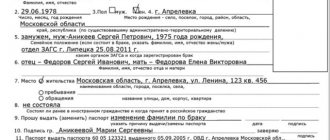Responsibility for an administrative illegal action refers to a special measure of punishment, expressed in the recovery of money from the offender as income to the state. This punishment is used to prevent repeated illegal actions by the same offender or to prevent other citizens from committing offenses. Administrative liability includes penalties for non-compliance with the norms of labor, housing, family, land, customs, antimonopoly, tax legislation, legislative norms on consumer rights and other branches of law.
Responsibility for administrative illegal actions is regulated by the Code of the Russian Federation No. 195-FZ of December 30, 2001 (as amended on November 28, 2018). An administrative penalty for an offense is imposed in accordance with Article 3.5. Code of Administrative Offenses of the Russian Federation Law No. 116-FZ of June 22, 2007.
What is an administrative fine?
An administrative fine is a financial penalty for committing an illegal offense. According to many lawyers, collection of funds for an administrative violation is the most effective way to punish a violator.
Any illegal action has three characteristics:
- Illegality, manifested in violation of established legal norms.
- Guilt, implying the presence of a fault in the action (the fault can be planned or executed through negligence).
- Punishability of an illegal act, that is, the imposition of an administrative penalty.
Illegal actions of an administrative nature can be divided into types in various areas:
- As part of the protection of the borders of the Russian Federation.
- In the agricultural production sector.
- In the field of property protection.
- In the field of natural protective measures in the environment.
- In the area of information and communication.
- In the field of military registration of persons.
- Within the framework of protecting public rules and state security.
Illegal offenses can cause harm to the health of individuals, encroach on property, sanitary conditions, morality, etc. Any illegal action must be accompanied by administrative punishment.
Types of administrative punishment:
- Warning.
- Confiscation of the instrument with which the offense was committed.
- Detention.
- Narrowing of the rights of an individual.
- Disqualification.
- Expulsion from the Russian Federation of a foreigner or individual without citizenship.
- Suspension of professional functioning.
- Administrative financial penalty.
Deadline for payment of an administrative fine
Regulatory acts of the Russian Federation allow 60 days to pay off an administrative penalty. In this case, after the announcement of the verdict, 10 days are given to appeal it. Thus, the violator has a total of 70 days to pay off the financial fine. If the debt repayment period is overdue, the bailiffs will be inactive for the first month. However, they will then take the following actions against the borrower:
- First, the debtor will be awarded another fine, usually in the same amount.
- The materials on the debtor will be re-sent to the judicial structure.
- Thus, a debt not paid on time may double in size already in the first overdue month.
- Repeated failure to repay the financial penalty may result in the offender being arrested for 15 days.
Didn't pay taxes
If an organization does not pay taxes and contributions on time or does not transfer them in full, tax authorities will issue a fine under Article 122 of the Tax Code of the Russian Federation. The reason for applying a fine may be an understatement of the tax base, incorrect calculation of the tax amount and other unlawful actions or inaction of the organization.
Fine amount:
- 20% of the debt amount if the organization underestimated the tax without intent. For example, an accountant incorrectly calculated taxes due to low qualifications;
- 40% of the unpaid amount if the tax was deliberately underestimated. For example, the company used a shell company. If the inspectors prove this, the fine will increase from 20% to 40% (Clause 3 of Article 122 of the Tax Code of the Russian Federation).
In addition to the fine, the tax office will begin to charge penalties for each calendar day of delay. For the first 30 days, penalties amount to 1/300 of the refinancing rate of the Central Bank of the Russian Federation. Starting from the 31st day, penalties increase by 2 times. The total amount of penalties cannot be greater than the arrears themselves.
Methods of paying an administrative fine
Any person who is imposed an administrative penalty must pay it off on time, otherwise he faces additional punishment in a more severe form.
The most common type of administrative punishment is a traffic police fine for non-compliance with traffic rules. This penalty is applied to prevent similar actions by the motorist in the future. In case of such a violation, the traffic police inspector draws up a protocol in which the violator must sign.
The protocol should display the following information:
- Date and place of execution of the document.
- FULL NAME. and the position of traffic police inspector.
- FULL NAME. and contact information of the driver who committed the offense.
- FULL NAME. and contact information for witnesses and victims (if any).
After a court order is issued to impose a penalty, the violator has the right to appeal the court decision within 10 days.
Judicial structures have 3 months at their disposal to force the violator to pay the fine, otherwise more severe penalties will be applied to him, including arrest.
How to pay such a fine in order to prevent further troubles?
It should be noted that today there are many ways to pay off debts to government agencies, using various online resources that provide services for transferring debts on fines without leaving home. To do this, you need to have a computer or mobile application and an Internet connection.
Among the most common ways to pay off administrative fines are the following:
- Service "Government Services".
- Sberbank Online.
- A number of payment systems, for example, Yandex money, QIWI.
Service "Government Services"
This service belongs to the official government resource called electronic government.
The resource provides a search for outstanding fines and their payment. The advantage of this resource is that no commission is charged when transferring funds.
To use the Gosuslugi portal, you must first register on it. After registration, opening the site, you need to find the required tab, fill in the driver's document number and car number.
The user will see a page displaying information about outstanding penalties, indicating the order number, date and location of the traffic violation.
To make a transfer to pay off a fine, you need to click on the “Pay” button located next to the name of the resolution.
Sberbank Online
This resource provides payment of administrative penalties online. Sberbank clients registered on the website have a personal account where they can make payments from a plastic card via the Internet.
To transfer money to pay off a debt, you need to select the “traffic police fines” tab in the “payments” section. Then you need to fill out information about transport and details of the punishment order. You can make another payment online in the same way.
Payment of administrative penalties is carried out by debiting funds from the client’s Sberbank account. Therefore, users are required to have the required amount in their account. The transfer is completed within 24 hours; no commission is charged when paying a fine.
Yandex money
To pay penalties using the Yandex resource, the user is required to register an account in the system.
First, you need to use the search mode to check for any outstanding debt. To do this, enter the driver's document number or vehicle registration certificate in the form that opens. The user will see a page with outstanding debts.
To pay off the debt, you need to click on the “pay” column. Money is debited from the payment system account or from an attached bank plastic card. The money transfer operation is carried out within a few minutes, the transfer fee is 1%.
Wallet – QIWI
The procedure for paying off fines in this resource is similar to the resource on Yandex. There is also a function to check for fines and transfers.
A traffic violation violator will need to fill out a form with the number of the resolution, the amount of the fine and the date of the violation.
Among the named fine payment services, Qiwi is the least popular payment system, since the transfer fee is 3%. To close the debt, you can use a bank plastic card, a Qiwi wallet account, or Web Money.
( Video : “The amount of fines for administrative offenses may be reduced”)
Administrative penalty
Over the past year, we have repeatedly encountered in our practice the holding of joint stock companies to administrative liability for offenses under Article 15.23.1 of the Code of Administrative Offenses of the Russian Federation. The amount of fines for legal entities ranges from 500 to 700 thousand rubles.
In my opinion, such fines are not fair and proportionate to the violations committed.
That is why my attention was drawn to the resolution of the Constitutional Court of the Russian Federation dated January 17, 2013 No. 1-P “In the case of verifying the constitutionality of the provisions of Part 5 of Article 19.8 of the Code of the Russian Federation on Administrative Offenses in connection with the complaint of the limited liability company “Maslyansky Grain Receiving Point” (hereinafter Resolution) .
It, in my opinion, shows the direction of possible future changes to impose an administrative fine below the lowest limit or another way to protect one’s own rights and interests.
This is exactly what my article is about today.
So. The administrative fine is below the lower limit.
Maslyansky Grain Receiving Point LLC, by a resolution of the Federal Antimonopoly Service for the Tyumen Region dated November 9, 2010, was found guilty of committing an administrative offense under Part 5 of Article 19.8 of the Code of Administrative Offenses of the Russian Federation, and was sentenced to an administrative fine in the amount of three hundred thousand rubles. The applicant did not comply with the requirement of the antimonopoly authority within the prescribed period. The arbitration courts, when considering the complaint against the decision of the Federal Antimonopoly Service, did not see any grounds for declaring it illegal.
Considering the received complaint, the Constitutional Court of the Russian Federation noted the following.
Legal regulation of liability for specific types of offenses is entrusted to the legislator, who, within the limits of his law-making powers, has the right to introduce and change measures of liability, including their type and size. At the same time, the permitted restrictions on the property rights of individuals and legal entities, freedom of economic activity must be based on general principles of law, meet the requirements of justice, be adequate, proportionate to constitutionally significant goals and values and necessary for their protection. Legal regulation should not encroach on the very essence of a particular right and lead to the loss of its real content.
The establishment of this administrative fine for legal entities, as well as other administrative fines for violations of antimonopoly legislation, which are noticeably larger in size than administrative fines for administrative offenses in other areas of legal regulation.
According to the legal position of the Constitutional Court of the Russian Federation, formulated in Resolution No. 11-P of July 15, 1999, the constitutional requirements of fairness and proportionality predetermine the differentiation of public legal liability depending on the severity of the act, the size and nature of the damage caused, the degree of guilt of the offender and other significant circumstances that determine individualization when applying certain measures of state coercion. In development of this legal position, the Constitutional Court of the Russian Federation, in Resolution No. 8-P of May 27, 2008, indicated that the measures established in the criminal law in order to protect constitutionally significant values should be determined based on the requirement of adequacy of the consequences generated by them (including for person in respect of whom they are applied) to the harm caused as a result of a criminal act, so as to ensure proportionality of criminal penalties to the crime committed, as well as a balance between the fundamental rights of the individual and the general interest of protecting the individual, society and the state from criminal attacks .
The given legal positions of the Constitutional Court of the Russian Federation can be extended to the administrative liability of legal entities, however, taking into account their specificity as subjects of law.
When introducing significant unalternative administrative fines as a measure of administrative liability, the legislator, due to the constitutional requirements of proportionality and individualization of legal liability, is obliged to introduce appropriate rules for the appointment and execution of administrative penalties, including criteria that allow properly taking into account the property and financial status of the person brought to administrative responsibility faces. Such accounting can be carried out in various ways, including by establishing “flexible” differentiation of the amount of penalties, softer alternative sanctions for specific types of administrative offenses, as well as rules for replacing specific sanctions with softer ones, including imposing an administrative penalty below the lower limit.
In the system of current legal regulation, exemption from administrative liability due to the insignificance of the offense committed cannot be used for the purposes of accounting for the property and financial situation of a legal entity brought to administrative responsibility. In addition, exemption from administrative liability by recognizing the offense as insignificant in all cases where the law enforcement agency, based on the circumstances established in the case, comes to the conclusion that the punishment provided for by a specific article of the Code of the Russian Federation on Administrative Offenses is disproportionate to the nature of the administrative offense, would be contrary to the principle justice to the principle of inevitability of responsibility, as well as the goals of administrative punishment, and would not ensure the solution of constitutionally significant tasks of the legislation on administrative offenses (Article 1.2 of the Code of Administrative Offenses of the Russian Federation).
In the current system of legal regulation, the application in relation to a legal entity of a significant lower limit of an administrative fine established by Part 5 of Article 19.8 of the Code of Administrative Offenses of the Russian Federation does not exclude the transformation of such an administrative fine from a measure of influence aimed at preventing administrative offenses into a tool for suppressing economic independence and initiative , excessive restrictions on freedom of enterprise and property rights.
The significant minimum amount of an administrative fine in the system of current legal regulation, which does not allow the imposition of an administrative penalty below the lower limit of the corresponding administrative sanction, does not allow in all cases to fully take into account the nature of the administrative offense committed, the property and financial position of the legal entity, as well as other matters that are important for the case, the essential circumstances and thereby ensure the imposition of a fair and proportionate administrative punishment.
Pending the introduction of appropriate changes to the Code of the Russian Federation on Administrative Offenses, the amount of the administrative fine imposed on a legal entity for committing an administrative offense provided for in Part 5 of Article 19.8 of the Code of Administrative Offenses of the Russian Federation may be reduced by the antimonopoly body or the court based on the requirements of the Constitution of the Russian Federation and the legal positions of the Constitutional Code of the Russian Federation. Courts of the Russian Federation, expressed in this Resolution.
It would seem that the conclusions made by the court when analyzing a specific legal norm are extremely easily transferred to other elements of administrative offenses. At least a number of applicants (offenders) and individual trial and appellate courts in different circuits have taken a similar expansive approach.
However, at the cassation level, all judicial acts in which the above interpretation of the Constitutional Court of the Russian Federation was freely applied (at least of those that we discovered when writing this material) were canceled or changed.
Here are some of them, with the corresponding motivation.
- At the same time, by reducing the amount of the fine below the lower limit provided for by the sanctions of parts 1 and 4 of Article 20.4 of the Code of Administrative Offenses of the Russian Federation, the court of first instance incorrectly applied the norms of substantive law, since the legal position of the Constitutional The Court of the Russian Federation was formed as a result of a legal analysis of the provisions of another norm of the Code of the Russian Federation on Administrative Offenses (Part 5, Article 19.8 of the Code of the Russian Federation on Administrative Offenses) and does not contain indications of the possibility of its extension to other elements of administrative offenses ( Resolution of the Federal Antimonopoly Service of the Russian Federation dated September 13, 2013 in case No. A46-32415/2012 ).
- The Constitutional Court of the Russian Federation did not recognize part 1 of Article 18.15 of the Code of Administrative Offenses of the Russian Federation, in accordance with the sanctions of which the punishment was imposed on society, as inconsistent with the Constitution of the Russian Federation. These circumstances do not allow us to apply in this case a punishment below the lower limit established by the sanction of Part 1 of Article 18.15 of the Code of Administrative Offenses of the Russian Federation ( Resolution of the Federal Antimonopoly Service dated April 1, 2013 in case No. A65-26865/2012 ).
- As follows from the determination of the Constitutional Court of the Russian Federation dated November 5, 2003 No. 349-O, vesting courts with the right to impose penalties below the lowest limit established by law, taking into account Part 1 of Article 4.1 of the Code of Administrative Offenses of the Russian Federation, is the prerogative of the legislator and is possible only by making appropriate changes and additions to Code of Administrative Offenses of the Russian Federation. In this regard, the appeal court also rightfully rejected the applicant’s reference to the decision of the Constitutional Court of the Russian Federation dated January 17, 2013 No. 1-P regarding giving courts the right to impose punishments below the lowest limit established by law. In paragraph 3 of the operative part of the said resolution it is stated that, pending the introduction of appropriate changes to the Code of Administrative Offenses of the Russian Federation, the amount of the administrative fine imposed on a legal entity for committing an administrative offense provided for in Part 5 of Article 19.8 of the Code may be reduced by the antimonopoly body or the court on the basis of the requirements of the Constitution of the Russian Federation and legal positions of the Constitutional Court of the Russian Federation, expressed in this resolution. However, the said act does not contain a conclusion about the possibility of applying the provisions of this resolution in relation to other administrative offenses. Therefore, the punishment cannot be imposed below the lower limit established by the sanction of the corresponding article of the Code of Administrative Offenses of the Russian Federation ( Resolution of the Federal Antimonopoly Service of the Northern Territory of September 12, 2013 in case No. A66-15098/2012 ).
In this regard, only two options for behavior are extremely logical.
Option 1 – our legislator will nevertheless go so far as to amend the Code of Administrative Offenses of the Russian Federation and provide for the possibility of reducing the amount of the administrative fine below the lowest limit.
Option 2 – initiate an appeal to the Constitutional Court of the Russian Federation for each element of an administrative offense, if the stated logic, the approach of the Constitutional Court of the Russian Federation is applicable to it. And if your appeal is considered justified, then the Constitutional Court of the Russian Federation may adopt the desired judicial act (after all, but the Constitutional Court in the resolution under consideration indicated that “The given legal positions of the Constitutional Court of the Russian Federation can be extended to the administrative liability of legal entities, however taking into account their specificity as subjects of law").
However, try to avoid the “monkey with a grenade” situation, because you never know where it will go. You should not apply to the Constitutional Court of the Russian Federation to obtain a “refusal” determination by the Constitutional Court of the Russian Federation, which may put an end to the possibility of imposing an administrative fine below the lower limit. Not only for you, but also for others. Please think about others too.
By the way, what is written in relation to an administrative fine can be applied, in my opinion, to other types of administrative penalties.
Amounts of administrative fines in 2021
The amount of the administrative penalty imposed depends on the type of violation and the consequences. When determining the amount of the penalty, the following points are considered:
- The nature of the actions and the resulting consequences as a result of the offense.
- Carrying out a repeated illegal action if the individual has been punished for such actions.
- The subject who committed the offense. The measure of punishment and the penalty imposed depends on the subject (individual, official or legal entity). Various penalties are imposed here.
Note. Punishment for an offense can be imposed not only as a separate penalty, but also in combination with other sanctions. For example, when driving while intoxicated, the driver may not only be fined, but also have his driver’s license confiscated. Or, for example, if an institution fails to comply with environmental standards and safety regulations, a fine may be issued to the enterprise with a simultaneous suspension of work.
A fine imposed on an individual goes to the state. The amount of the penalty depends on the following points:
- The minimum wage (without taking into account regional coefficients), established by law on the date of completion of the offense or on the date of its detection.
- Assessment of the subject on the date of completion of the offense or on the date of its suppression.
- The amount of tax debt intended for payment on the date of completion of illegal actions or on the date of suppression, or the size of a currency transaction carried out in violation of the law.
Note. The amount of an administrative fine cannot be less than 1/10 of the minimum wage. This norm is used both for Muscovites and for other individuals (including foreign citizens) located or living in the Russian Federation.
When fines are imposed on an official under the Code of Administrative Offenses of the Russian Federation
The general rule established by Article 2.4. The Code of Administrative Offenses of the Russian Federation states:
“An official is subject to administrative liability if he commits an administrative offense in connection with failure to perform or improper performance of his official duties.”
Citizens who are officials are divided into several categories:
- citizens who permanently, temporarily or under special powers exercise the functions of a government representative. That is, they are vested with administrative powers in relation to persons who are not officially dependent on him.
- persons who perform organizational and administrative or administrative functions in state and local bodies, state extra-budgetary funds, troops and military formations
- employees of organizations (legal entities) who have committed administrative offenses in connection with the performance of organizational and administrative or administrative functions, incl. managers, founders of organizations, members of the board of directors, etc.
- members of procurement commissions, contract service employees
- members of the licensing commission, etc.
As a general rule, an individual entrepreneur bears responsibility as an official. That is, fines for an official and an entrepreneur are usually equal in size. But the essence of responsibility for an official and for an entrepreneur is different. A manager, accountant, personnel officer, etc. are usually brought to administrative liability in connection with improper performance of official duties. The authorized body will determine the functionality according to the job description. Or assigned duties issued to powers of attorney from a legal entity.







